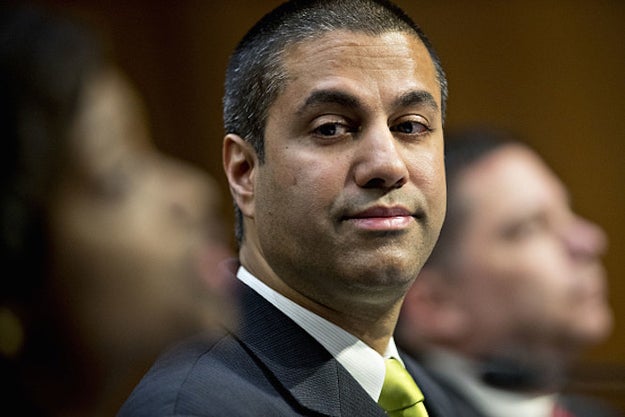
Ajit Pai, chairman of the Federal Communications Commission (FCC)
Andrew Harrer / Getty Images
FCC Chairman Ajit Pai outlined his plan to roll back net neutrality rules during a speech at the Newseum in Washington, DC today.
The proposal Pai outlined has three parts: First, he plans to reclassify the internet as an information service, as it was classified under President Clinton, rather than a telecommunications service. When the FCC passed net neutrality rules in 2015 and reclassified internet companies as a kind of public utility, like telephone companies, it gave the commission more solid legal footing to impose tighter regulations.
Pai said he also plans to do away with the Internet conduct standard, which he characterized as “a roving mandate to micromanage the Internet.” The standard was used to investigate whether or not data cap exemptions (like those T-Mobile and Comcast sometimes offered customers) unfairly favored some content over others.
Pai is also seeking to overturn the “so-called bright lines rules” of neutrality, which prevent ISPs from blocking websites and services, slowing them down, or creating internet “fast lanes” for certain services and content in exchange for a premium.
David Segal, executive director of the internet activism nonprofit Demand Progress, called the announcement “outrageous.” “Millions of Americans as well as internet companies, startups, innovators, and nonprofits have supported the order. The order’s main opponents are large ISPs that have made it clear they want to subvert the public interest by manipulating internet traffic to benefit corporate bottom lines,” he said in a statement.
Pai, who was nominated to his position as chairman of the FCC by President Trump, was formerly general counsel for Verizon. The argument he and other opponents of net neutrality make is that regulating the internet as though it were a public utility puts a damper on competition, making it harder for small businesses to grow.
In his speech Wednesday, Pai argued that his proposed rules would help increase investment in building networks. “More Americans will go to work building these next generation networks,” said Pai. “These are good, paying jobs — laying fiber, connecting equipment to utility poles, and digging trenches.”
Pai argued that Google, Facebook and Netflix became some of the “world’s most successful online companies” as a result of the more lenient internet regulation that existed prior to 2015. But earlier this month, representatives from those three companies met with Pai via a trade organization called the Internet Association, and asked him to support net neutrality, which they argued, “preserves the consumer experience, competition, and innovation online.”
Pai's proposal isn&039;t likely to pass without a fight. Several other tech companies, including Vimeo and Mozilla, have also spoken out against Pai&039;s proposal. And activist groups like Fight for the Future, which advocates for net neutrality and was part of an effort to get 3.7 million people to file comments on net neutrality with the FCC in 2014, are also gearing up for a fight.
“Pai’s speech was an insult to the intelligence of internet users,” said campaign director Evan Greer in an email statement. “He attempts to portray basic free speech protections as heavy handed government regulation.”
Pai will formally introduce his Notice of Proposed Rulemaking to the FCC on Thursday; the proposal will be discussed at a committee meeting on May 18th, after which it will be open to public comment. “In other words, this will be the beginning of the discussion, not the end,” Pai said during his live-streamed speech on Wednesday.
Quelle: <a href="Here&039;s What We Know About The FCC&039;s Plan To Roll Back Net Neutrality“>BuzzFeed
Published by